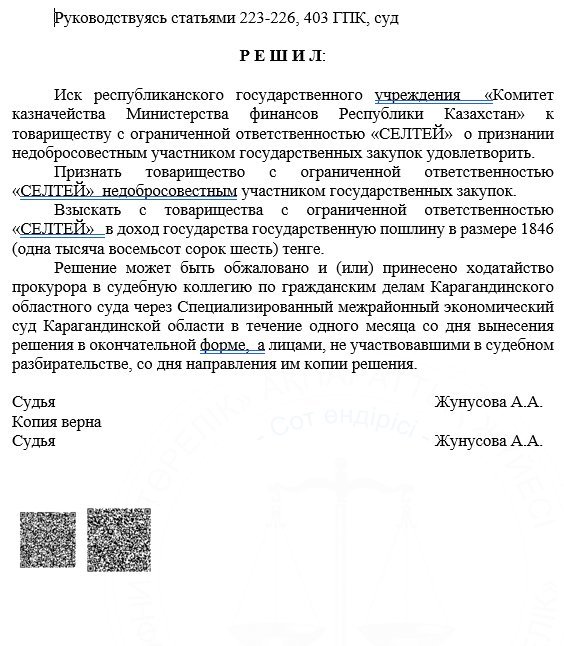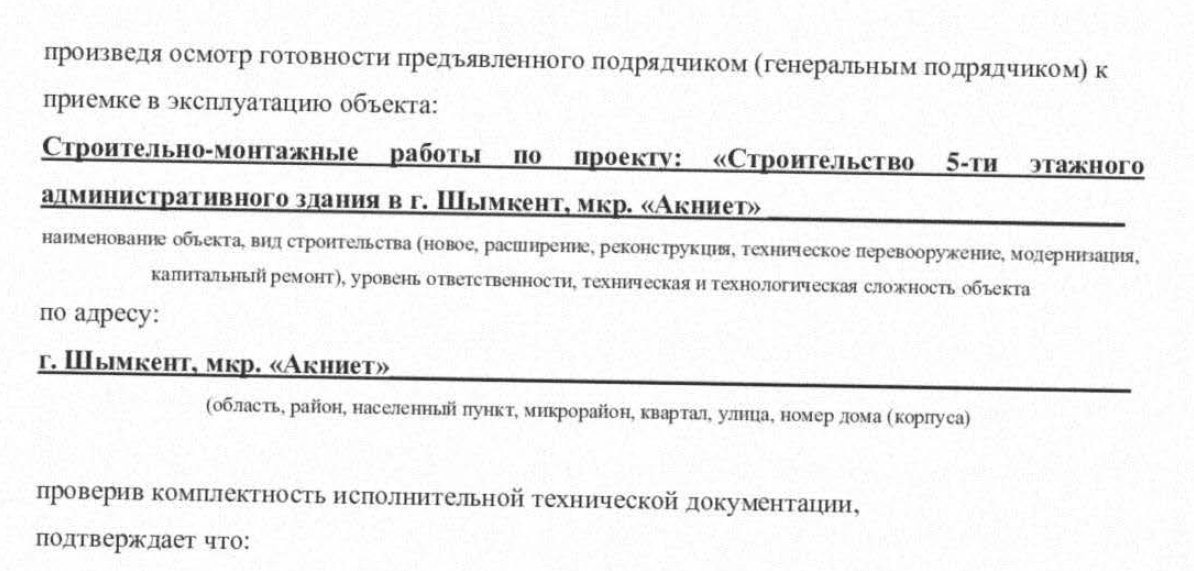Shymkent Should Be Dubai: Digital Procurement System Undermined by Document Fraud
 Photo: Orda.kz
Photo: Orda.kz
In 2022, Kazakhstan’s Ministry of Finance declared a new chapter in public procurement: less bureaucracy, more transparency, and algorithms replacing human decision-making. Central to this was the launch of the rating-point system (RPS) — an automated mechanism meant to eliminate corruption by removing people from the process.
But by 2024, it became clear: corruption hadn’t vanished — it had simply gone digital. Orda.kz explains how some learned to outsmart the country’s procurement system.
RPS: A Theoretical End to Favoritism
The idea behind the RPS was straightforward: the contractor with the highest score wins. No more commissions, no more human interference. Appeals were only allowed in court, not via internal audit departments.
Everything was handled by an algorithm that scored companies based on their electronic profiles, including past experience, tax contributions, registration in the same region as the buyer, and a negative performance history.
Contractors uploaded their documents, earned points, and joined the bidding process.
Special attention was given to the construction sector, long considered one of the most corruption-prone.
Previously, tenders were won through “connections”: whoever was closer to the local Akims, or had friends in the audit departments, came out on top. In theory, the RPS closed those backdoors.
To do any construction work, you need to issue a notice of commencement. Once that’s issued and confirmed by State Architectural and Construction Control, they can draw up a completion certificate listing a dozen subcontractors for a single 70-square-meter house. That way, everyone gets a boost to their ratings, and they start winning tenders all over Kazakhstan. They ‘build’ hundreds of these projects on paper every month. If you believe the documents, Shymkent should already be Dubai,construction entrepreneur Nurzhan Shakenov told Orda.kz.
How It Fell Apart
The first red flags appeared in 2023. On online platforms like OLX and Telegram, offers for “help with public procurement” became increasingly common. These weren’t just consulting services — forged documents, fake certificates, and falsified engineering supervision records.

People found a way to fabricate experience points — the key metric for winning tenders. They created fake contracts and work completion certificates. Some Akimats in the southern regions digitally signed off on these fake papers through the official procurement portal, using their electronic signatures.
This gave the fake documents a semblance of legitimacy.
Despite the well-known fact that the public procurement portal stores every keystroke, some civil servants still took the risk.
Once “verified,” the fake experience was uploaded to the electronic depository, allowing the companies to participate in public procurements across the country. Visually and formally, everything looked legal.
Earlier this year, we found a lot of tenders awarded through single-source procurement. Another issue we uncovered: Rural Akims are allowed to buy from a single source when competitive bidding is not possible. They aren't bothered and make purchases without tender. We are familiar with all our competitors, to some extent. So if a familiar company enters a bid against me, I know my chances. But now I see a bunch of unfamiliar firms. We, with 20 years of construction experience, are being outbid by companies with no track record. And the most frustrating part is that after winning, they turn around and resell the project to us, local contractors, at 20% less. We have no choice but to take it. This isn't public procurement anymore, we call it a bazaar,said Timur Shakenov.
In 2025, the Qaraganda Regional Court ruled that Shymkent-based Seltey LLP had submitted false information about its work experience and officially labeled the company an unscrupulous participant in public procurement:
On February 15, 2024, Seltey LLP won a tender to carry out major renovations on the rural cultural center in the village of Tsentralnoye, Bukhar-Jyrau district, for 135.3 million tenge. To be eligible for such a construction tender, a company must demonstrate relevant experience, as evidenced by documents such as a facility acceptance certificate and work completion certificates, all of which must be uploaded to the electronic depository. At the time, public procurement rules required these documents to pass a two-stage verification process by government agencies. To win the competition, the company used the work experience from the depository under numbers 3630620 (construction of a nine-story residential building in Shymkent), 3630602 (another construction of a nine-story residential building in Shymkent), 3625968 (construction of a five-story administrative building, also in Shymkent), the supposed clients for these projects were EuroAsia Stroy LLP and Legion 2030 LLP. However, both firms had zero financial turnover. So these 'clients' likely had nothing more than a company stamp, a printer, and some paper, the expert added.
Yet, Seltey LLP managed to get these questionable records officially validated by Shymkent’s Department for Urban Environment Quality Control, who simply clicked the "confirm" button on the digital portal, allowing the fabricated experience to pass as legitimate.

The uploaded documents, along with the department’s digital approval, were then sent to the Treasury Committee. It’s important to note that Seltey LLP was later blacklisted as an unscrupulous participant in public procurement for submitting false work experience.
The same nine-story residential buildings and administrative offices in Shymkent do not exist — a fact that the Shymkent Akimat, which verified the documents, must have been aware of.
Nevertheless, according to the contract registry, Seltey LLP managed to sign government contracts worth a total of 2.67 billion tenge. And this is just one example. Officials from the department assisted dozens of companies in falsifying similar records.
The financial damage to the state is incalculable. Court records contain numerous rulings by the SIEC confirming the direct involvement of government employees.

How the scheme works:
- A fake contract is drawn up between the contractor and a fictitious customer — a private company
- Documentation is created: fake certificates of project completion, facility acceptance, and construction commencement
- Records of technical and architectural oversight are added to the mix
- All of these documents are uploaded to the web portal, as if the project were real and completed
- The forged files are then submitted via the portal for verification to local architecture departments or the State Architectural and Construction Control
- Once approved by these agencies, the documents go to the Treasury Committee at the Ministry of Finance
- The contractor now earns the necessary points under the rating system (RPS) and becomes eligible to win tenders worth millions — or even billions— of tenge
Who’s Involved?
Journalists and industry insiders say an entire market for these fake “experience packages” is thriving on Telegram. One name that frequently appears is that of a woman named Asel from Pavlodar. The going rate for a guaranteed tender win is between 30 to 50 million tenge. The sellers claim that all documents are checked and approved by all necessary government agencies.
These middlemen aren’t exactly hiding. Their contacts are public, and they appear to have little concern for legal consequences.
How?
Local officials — from architecture departments to the State Architectural and Construction Control and Akimats — became active participants in the fraud. According to sources, the Ministry of Finance is well aware of what’s going on.
While efforts have been made to curb the spread of fake documents, insiders with in-depth knowledge of the system have continued to find ways around new safeguards, such as re-verification of experience and stricter documentation requirements.
Consequences
Today, contracts aren’t won by the most qualified builders, but by those who can best forge documents. Billions in taxpayer money lost. Instead of real schools and hospitals, the country is building paper trails and illusions.
What’s next?
Experts in the construction industry are urging the Ministry of Finance to move away from simply adding more bureaucratic layers and start verifying real-life projects.
They say it’s time for the Prosecutor General’s Office to investigate who is behind these fraudulent schemes and how they are managing to work hand-in-hand with public officials.
However, the alternative is a complete rollback of digital procurement and a return to the old-school world of kickbacks and under-the-table deals.
The Ministry of Finance is aware of the loopholes and says it is preparing amendments to close the legal gaps.
The public procurement process constantly needs improvement. One of our primary priorities is to tighten the verification of work experience. We have certain manipulations on the part of businesses regarding work experience. We want to nip them in the bud and adopt conceptually tough amendments in the interests of the state and of honest, law-abiding businesses. Our amendments will be aimed specifically at work experience,said Vice Minister of Finance Dauren Kenbeil during a recent Central Communications Service briefing.
Original Author: Ilya Astakhov
Latest news
- Mother Questions Official Account of National Guard Conscript’s Death in Oral
- KazTransOil to Boost Oil Supplies to Kyrgyzstan, Resume Transit to Uzbekistan
- Russian Teen Who Fled to Kazakhstan to Escape War Faces Deportation
- Lawyer Comments on Gulnara Bazhkenova's House Arrest Conditions, Appeals to International Organizations
- Kazakhstan Marks Independence Day, Remembering the Tragic December Events of 1986
- Kremlin Spokesperson Says Ukraine’s Non-NATO Status Is Central to Peace Talks
- Kcell Receives Certification for Information Security
- Uzbekistan Aims to Halt Gas Production Decline by 2026 With New Fields
- Kyrgyzstan: Culture Ministry Denies Reports of Ban on Valery Meladze Concert
- Kazakh Ophthalmologist Wins International Honors at Hong Kong ICT Awards 2025
- Kazakhstan: Construction Industry Urges for Return to Previous Time Zone
- KTZ Spends 79 Million Tenge on New Workwear After Complaints From Mangystau Employees
- Armenian Defense Minister Says Situation Calm Along Border With Azerbaijan
- Zelenskyy Signals Ukraine Could Forego NATO Membership in Exchange for Security Guarantees
- Kazakhstan Says Damage From Drone Attack on CPC Facility Still Being Assessed
- Kazakhstan May Build Planned Thermal Power Plants Independently Amid Delays in Russian Financing
- Expert Warns Sale of Transtelecom Stake Overlooks Kazakhstan’s National Security Risks
- Kazakhstan Says Alternative Oil Export Routes Are Available Amid CPC Infrastructure Issues
- Former Foreign Ministry Spokesman Aibek Smadiyarov Appointed Head of Domestic Policy Department
- Kadyrov Says He Is Ready to Run Again as Chechnya’s Head in 2026

